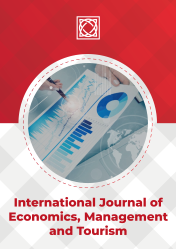RISING INTEREST RATES REDUCE INFLATION: AN EMPIRICAL STUDY FOR THE REPUBLIC OF NORTH MACEDONIA
DOI:
https://doi.org/10.46763/IJEMT2222060mgKeywords:
: Inflation, İnterest rates, Cointegration, Monetary policyAbstract
This article aims to help us understand what rising inflation will mean in this low interest rate environment. This paper analyzes the current developments with growing inflation and makes a theoretical and empirical analysis of the interactions between interest rates and inflation in North Macedonia.
In the theoretical part, the review of the literature revealed that some of the researchers established a unidirectional relationship between the inflation and the interest rate, and some a bidirectional relationship. In the empirical analysis, the daily data of the Central Bank od the Republic of North Macedonia for inflation and interest rates for the period 2006:01 – 2022:06 were used.
Granger Causality Test was used to determine the relationship and its direction in the short term through VECM. As a result of the analysis, bilateral causality among variables was determined in the short term. In other words, inflation is a cause of interest rate and interest rate is a cause of inflation. An increase in interest rates reduces inflation. But, the main problem with using interest rates to control inflation are lags, because take time to affect inflation trends. Yet the NBRSM's adherence to its inflation target can only be gauged with backward-looking inflation statistics. But, at this point, no one really knows how high interest rates might need to climb in order to get inflation back down without creating too much additional unemployment.
The findings have practical policy implications for decision makers in the area of macroeconomic planning, particularly in North Macedonia.

